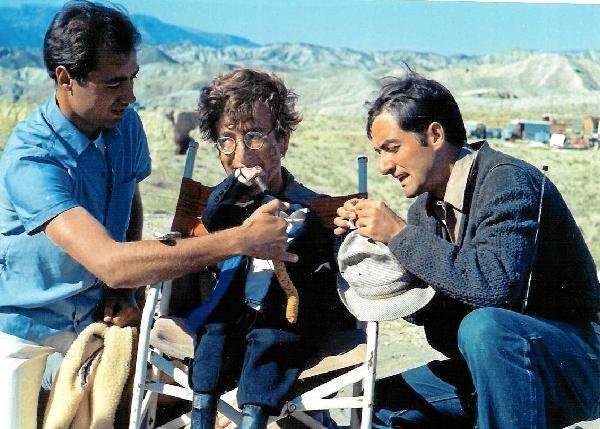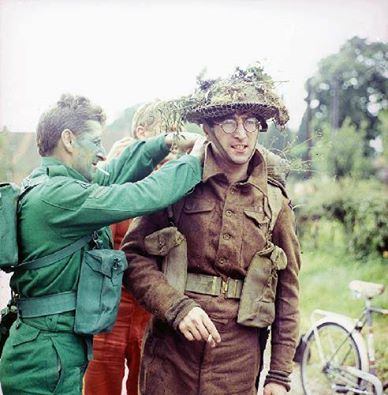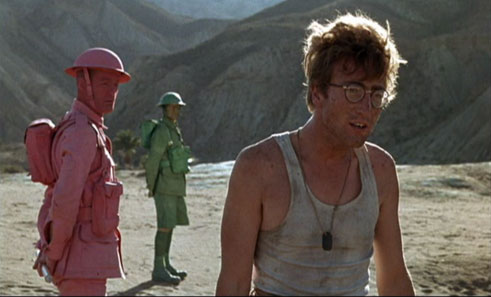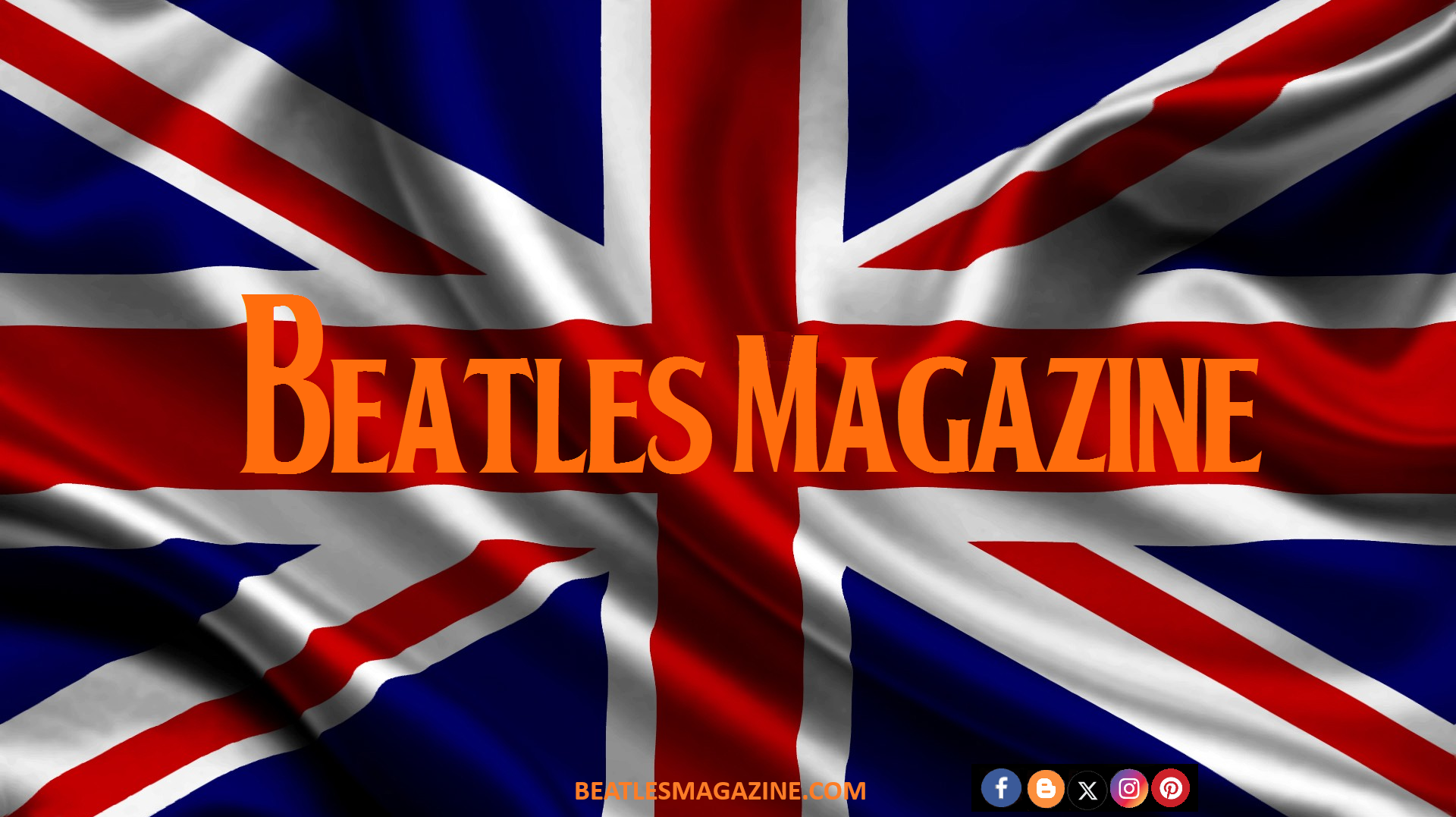In the fall of 1966, Look magazine’s European editor Leonard Gross and photographer Douglas Kirkland visited John Lennon on-location during the filming of ‘How I Won The War.’ The article, entitled ‘John Lennon: A Shorn Beatle Tries It On His Own’, would be published in Look ,1966
 Whoever would have dreamed that beneath that mop lurked a Renaissance man? Yet there, shorn, sits John Lennon, champion minstrel, literary Beatle, coarse truthsayer, who turned Christendom on with one wildly misunderstood gibe at cant. Now, face white, tunic red, playing wounded in a field of weeds, this pop-rock De Vinci is proposing to act for real. Relaxed to all appearances, he is all knots inside. “I was just a bundle of nerves the first day. I couldn’t hardly speak I was so nervous. My first speech was in a forest, on patrol. I was suppose to say, ‘My heart’s not in it any more’ and it wasn’t. I went home and said to myself, ‘Either you’re not going to be like that, or you’re going to give up.’”
Whoever would have dreamed that beneath that mop lurked a Renaissance man? Yet there, shorn, sits John Lennon, champion minstrel, literary Beatle, coarse truthsayer, who turned Christendom on with one wildly misunderstood gibe at cant. Now, face white, tunic red, playing wounded in a field of weeds, this pop-rock De Vinci is proposing to act for real. Relaxed to all appearances, he is all knots inside. “I was just a bundle of nerves the first day. I couldn’t hardly speak I was so nervous. My first speech was in a forest, on patrol. I was suppose to say, ‘My heart’s not in it any more’ and it wasn’t. I went home and said to myself, ‘Either you’re not going to be like that, or you’re going to give up.’”
As he casts his weak brown eyes at the camera, the entire movie company jockeys for a glimpse. “I don’t mind talking to the camera — it’s people that throw me.”
Sure enough, he blows his lines. He waggles his head in shame. “Sorry about that.” But under the low-key coaxing of Director Dick Lester, Beatle John becomes Private Gripweed, a complex British orderly, in a film, How I Won The War.
 Lennon at 26, said: “I feel I want to be them all– painter, writer, actor, singer, player, musician. I want to try them all, and I’m lucky enough to be able to. I want to see which one turns me on. This is for me, this film, because apart from wanting to do it because of what it stands for, I want to see what I’ll be like when I’ve done it.” “I don’t want people taking things from me that aren’t really me. They make you something that they want to make you, that isn’t really you. They come and talk to find answers, but they’re their answers, not us. We’re not Beatles to each other, you know. It’s a joke to us. If we’re going out the door of the hotel, we say, ‘Right! Beatle John! Beatle George now! Come on, let’s go!’ We don’t put on a false front or anything. But we just know that leaving the door, we turn into Beatles because everybody looking at us sees the Beatles. We’re not the Beatles at all. We’re just us.” “But we made it, and we asked for it to an extent, and that’s how it’s going to be. That’s why George is in India (studying the sitar,) and I’m here. Because we’re a bit tired of going out the door, and the only way to soften the blow is just to spread it a bit.”
Lennon at 26, said: “I feel I want to be them all– painter, writer, actor, singer, player, musician. I want to try them all, and I’m lucky enough to be able to. I want to see which one turns me on. This is for me, this film, because apart from wanting to do it because of what it stands for, I want to see what I’ll be like when I’ve done it.” “I don’t want people taking things from me that aren’t really me. They make you something that they want to make you, that isn’t really you. They come and talk to find answers, but they’re their answers, not us. We’re not Beatles to each other, you know. It’s a joke to us. If we’re going out the door of the hotel, we say, ‘Right! Beatle John! Beatle George now! Come on, let’s go!’ We don’t put on a false front or anything. But we just know that leaving the door, we turn into Beatles because everybody looking at us sees the Beatles. We’re not the Beatles at all. We’re just us.” “But we made it, and we asked for it to an extent, and that’s how it’s going to be. That’s why George is in India (studying the sitar,) and I’m here. Because we’re a bit tired of going out the door, and the only way to soften the blow is just to spread it a bit.”
In that kind of mood, a Dick Lester set was just the therapy for Lennon. Each man is the kind who makes the New Theologians jump. To them, the individual is more thrill than threat — a unique being who should be taken for what he is. Lester, who directed both Beatle films, gratefully recalls his first meeting with the group, when the movies were just an idea. “They allowed me to be what I damn well pleased. I didn’t have to put on an act for them, and they didn’t put one on for me.” This is what a Lester set is like: Once more, they are in a deserted German square, now, with all the paraphernalia of movie-making, with British ‘soldiers,’ Lennon among them, ready to comb the streets, with German ‘soldiers’ lying in wait. “Quiet please!” an assistant shouts — just as a little boy walks into the scene. Apoplectic, the assistant rushes forward and shoves the child aside. Lester, whose normal weapon is humor, flushes. “Don’t push!” he commands.
 Lennon’s lack of pretense astonished the actors. “He’s someone who just tries anything,” one of them marveled. “No stand-in, no special treatment, no chair for him.” During a break for tea one raw morning, Lennon queued with the rest. When his turn arrived, his heart’s desire was gone. “You don’t have to be a star to get a cheese sandwich,” he mused. “You just have to be first.” They like his humor too. That same morning, a German mother pushed her three-year-old son up to the Beatle, clutching his autograph book in his hand. “Sign it!” she demanded. Lennon did as bidden, telling the boy, “Yes, sir, you put us where we are today.” On location in Spain one afternoon, the script required Lennon to drive a troop carrier along the beach. Accelerating too fast, he spun the wheels; the rear of the carrier sank. As his crestfallen director approached the cab, Lennon peered sheepishly over his glasses and gave him a limp salute.
Lennon’s lack of pretense astonished the actors. “He’s someone who just tries anything,” one of them marveled. “No stand-in, no special treatment, no chair for him.” During a break for tea one raw morning, Lennon queued with the rest. When his turn arrived, his heart’s desire was gone. “You don’t have to be a star to get a cheese sandwich,” he mused. “You just have to be first.” They like his humor too. That same morning, a German mother pushed her three-year-old son up to the Beatle, clutching his autograph book in his hand. “Sign it!” she demanded. Lennon did as bidden, telling the boy, “Yes, sir, you put us where we are today.” On location in Spain one afternoon, the script required Lennon to drive a troop carrier along the beach. Accelerating too fast, he spun the wheels; the rear of the carrier sank. As his crestfallen director approached the cab, Lennon peered sheepishly over his glasses and gave him a limp salute.
“The class thing is just as snobby as it ever was. People like us can break through a little — but only a little. Once, we went into this restaurant and nearly got thrown out for looking like we looked until they saw who it was. ‘What do you want? What do you want?’ the headwaiter said, ‘We’ve come to bloody eat, that’s what we want,’ we said. The owner spotted us and said, ‘Ah, a table sir, over here, sir.’ It just took me back to when I was 19, and I couldn’t get anywhere without being stared at or remarked about. It’s only since I’ve been a Beatle that people have said, ‘Oh, wonderful, come in, come in,’ and I’ve forgotten a bit about what they’re really thinking. They see the shining star, but when there’s no glow about you, they only see the clothes and the haircut again.”
“I’m not a cynic. They’re getting my character out of some of things I write or say. They can’t do that. I hate tags. I’m slightly cynical, but I’m not a cynic. One can be wry one day and cynical the next and ironic the next. I’m a cynic about most things that are taken for granted. I’m cynical about society, politics, newspapers, government. But I’m not cynical about life, love, goodness, death. That’s why I really don’t want to be labeled a cynic.”
It is in the context of the young man who recoils at distortion that his now-famous remark should be viewed.
source:videomuzic.eu

